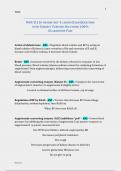1
WGU
WGU D116 PHARM UNIT 4 CARDIO EXAM QUESTIONS
WITH CORRECT VERIFIED SOLUTIONS 100%
GUARANTEED PASS
Action of aldosterone - ANS ✓Regulates blood volume and BP by acting on
distal tubules of kidney to cause retention of Na and excretion of K and H,
because water follow sodium, it increases blood volume
Renin - ANS ✓hormone secreted by the kidney; released in response to low
blood pressure/blood volume/plasma sodium content by catalyzing formation of
angiotensin I from angiotensinogen; influencing vasoconstriction (narrowing of
blood vessels)
Angiotensin-converting enzyme (Kinase II) - ANS ✓Catalyzes the conversion
of angiotensin I (inactive) to angiotensin II (highly active)
Located on luminal surface of all blood vessels, esp in lungs
Regulation of BP by RAAS - ANS ✓Factors that decrease BP (hemorrhage,
dehydration, sodium depletion) turn RAAS on
When BP rises turn RAAS off
Angiotensin-converting enzyme (ACE) inhibitors "pril" - ANS ✓lower blood
pressure by inhibiting the conversion of angiotensin I (an inactive enzyme) to
angiotensin II (a potent vasoconstrictor)
Use: HTN, heart failure, diabetic nephropathy, MI
Decreases peripheral resistance
Dry cough
Decreases progression of kidney disease in diabetics
Lowers glomerular filtration rate
Do not give in preg
WGU D116
, 2
WGU
Lisinopril - ANS ✓Prinivil, Zestril;
ACE Inhibitor; Hypertension/heart failure
MOA: decrease level of ang II, increases bradykinin
Pharm effects: dilate blood vessels, decrease blood volume, prevent or reverse
changes in heart, increased urination (due to ADH inhibition) which decreases
CO
Adverse: COUGH, 1st dose hypotension, hyperkalemia, renal failure, avoid in
PREG, angioedema, neutropenia
Drug interactions: diuretics, anti hypertensives, drugs that increase K, lithium,
NSAIDS
Angiotensin II Receptor Blockers (arbs) "sartin" - ANS ✓Lower blood
pressure by blocking the angiotensin II receptor from binding
Use: HTN, heart failure, diabetic nephropathy, MI, prevention of MI
-prevent production of aldosterone which decreases sodium and water
reabsorption
Decreasing blood volume which will increase urination
*fetal toxicity and neonatal mortality
Losartan (Cozaar) - ANS ✓ARB (angiotensin II receptor blocker)
Moa: blocks access of ang II from its receptors in blood vessels, adrenal and other
tissues which causes vasodilation and decreased aldosterone
Use: HTN, heart failure, diabetic nephropathy/retinopathy, MI, stroke prevention
Adverse: angioedema, Renal failure, can decrease BP too much when combo with
other anti hypertensives, do not use in PREG
Aldosterone Antagonists - ANS ✓Eplerenone (Inspra)
Moa:selective block of aldosterone receptors, retention of K, increased secretion
of Na and water which decreases blood volume and BP
Use: HTN, heart failure
WGU D116
, 3
WGU
Adverse: hyperkalemia
Interactions: inhibitors of CYP3A4 can increase levels, drugs that raise K, can
increase lithium levels
Spironolactone (Aldactone)
Moa: non selective blocker of hormone receptors (glucocorticoids, progesterone,
androgens)
Adverse: gynecomastia, men strap irregularities, impotence, hirtuism, deepening
voice
Calcium Channel Blockers (CCB) - ANS ✓increase Na+ excretion and cause
arteriolar vasodilation by preventing the movement of extracellular Ca+ into cells
Greatest effects in heart and blood vessels
(Decreases force of contraction, decreases HR, suppress conduction through AV
node)
Calcium Channel Blockers classes {dipine} - ANS ✓Dihydropyridines-act
mainly on blood vessels
Non-dihydropyridines-act on heart and blood vessels
Relaxes arterial muscle cells
Can cause peripheral edema
Verapamil (Calan) - ANS ✓non-dihydropyridine calcium channel blocker;
Use: angina, HTN, dysrhythmias
Hemodynamic effect:
*direct and indirect neutralize each other
Net result are vasodilation, decreased arterial pressure and increased coronary
perfusion
Adverse: constipation, dizzy, face flushing, HA, edema ankles/feet, bradycardia,
AV block, decreased contraction
Interactions: digoxin, b blockers, grapefruit
WGU D116




